South Africa
A few days after South Africa's top court ordered the release on parole of Janusz Walus, the ruling continues to cause outrage.
Groups, the family of late Chris Hani and political parties have slammed the decision.
Walus has served over two decades of a life sentence for the murder in 1993 of Hani, an anti-apartheid leader.
"It took the country to the to the edge of civil war, Faizel Moosa, a former South African ambassador to Qatar says.
"If it wasn't for Mandela making that statement that he did asking for calm and forcing the de Klerk government to come up with a date for elections. I mean, de Klerk couldn't even do that. I mean, it took Mandela to calm down the situation."
Polish-born Janusz Walus shot dead Chris Hani in the driveway of his house on April 10, 1993, in Boksburg, a suburb east of Johannesburg.
51-year-old Hani was the general secretary of the South African Communist Party (SACP) and chief of staff of Umkhonto we Sizwe, the armed wing of the ruling African National Congress (ANC).
Open wound
In a 47-page long judgement, the Constitutional Court detailed how it came to rule in the application opposing Walusz, the minister of Justice and Correctional Services and Others.
Still, Hani's widow called the ruling "diabolical" and Solly Mapaila, leader of the SACP, a political ally of the ruling ANC, said it was unjust.
In a statement, the communist party said Hani's murder "left a gaping wound in his family, the SACP and the ranks of the working class. The judgment has rubbed salt granules to the wound."
Walus "was convicted of very serious crime... cold blooded murder", said Constitutional Court judge Chief Justice Raymond Zondo, adding "his conduct nearly plunged this country into civil unrest", but he was entitled under law to parole.
"The fact that he never apologised not only to the Hani family to the, to the political parties, but to South Africans", is still outrageous for Faizel Moosa.
"He derailed, it firstly took us to the to the edge of civil war, like I said, and then it derailed the future of our country."
1993 was indeed a pivotal year in South Africa's modern history. Negotiations to end apartheid had entered their final phase.
In assassinating Chris Hani, Walus "seemed to have been intent on derailing the attainment of democracy by this country", said Zondo.
Hani's murder led to protests and rioting in black townships. Every April 10, South Africans remember the communist stalwart at commemorative events and lay flowers at his grave in the east of Johannesburg.
Unrelenting
Janusz Walus was convicted for the murder of Chris Hani on 15 October 1993 on charge of murder and the illegal possession of firearm. He was sentenced to death for the murder, and given five years for the illegal possession of the firearm.
The death sentence was commuted to life imprisonment on 7 November 2000 after the Rainbow nation abolished death penalty.
His accomplice, Clive Derby-Lewis, who supplied the gun that shot Hani, was released in 2015 on medical parole after 22 years in jail. He died of lung cancer in 2016, aged 80.
Walus and him appealed to the Truth and Reconciliation Commission which did not grant them amnesty.
At that time Walus said that he was driven by political, anti-communist motives to kill Hani, a claim he repeated before a Polish journalist (Cezary Lazarewicz) in 2018. According to Lazarewicz, Walus said he "he was very sorry for killing Lindiwe's father [daughter of Hani]. But he never regretted [killing a] communist leader."
Speaking to the BBC Lazarewicz added: "He [Walus] told me, in 1993, there was a war in South Africa and he felt like a soldier... he still believes in the system of racial segregation and that whites and blacks should live apart."
Grey areas
Janusz Walus made numerous applications for parole which "were all refused for various reasons", the Constitution Court judgement read.
One of them in 2020 was strongly opposed by the SACP. In a statement published at the time, the South African Communist Party argues that "there must be full disclosure of the truth towards justice and closure."
Adding: "The murder weapon used by Waluś was taken from military armoury. Details pertaining to who took the gun, whose hands did it go through until it was used in the final stage of the assassination, and all other connected details, remain part of the hidden truth."
South Africa's former ambassador to Qatar, Faizel Moosa, doubles down: "everybody wants to know who gave the order, and we didn't get out to the truth."
Moosa fears Monday's ruling is an "indictment" on the country's constitution and legal system
"And I think this is where we're stuck. [The] judgment was an indictment on our constitution and our law.", he regretted.
"It proves that in certain aspects, the judiciary is willing to interpret the law very strictly. And in other aspects, I'm thinking of the St James massacre and those APLA guys that's still languishing in jail."
According to the court judgement, Walus must be released on parole within 10 calendar days from Monday.




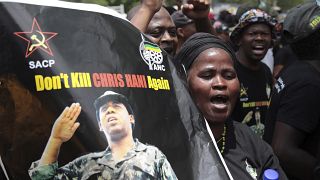
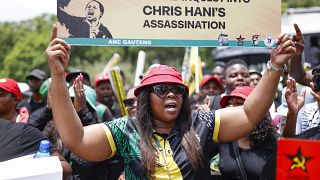
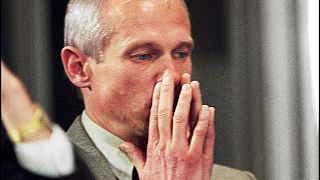
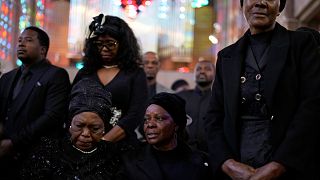
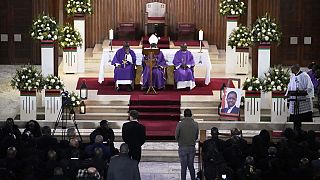
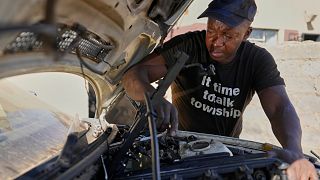



01:04
South Africa: ANC partner quits key govt initiative as new spat hits coalition
Go to video
African gut study reveals urbanization threatens microbial diversity
01:09
Kenyan Police officers charged over death of blogger in custody
01:00
Pix of the Day: June 19, 2025
01:23
Hero's welcome for South African men's cricket team
00:52
Imprisoned singer R. Kelly alleges "murder plot" against him in prison